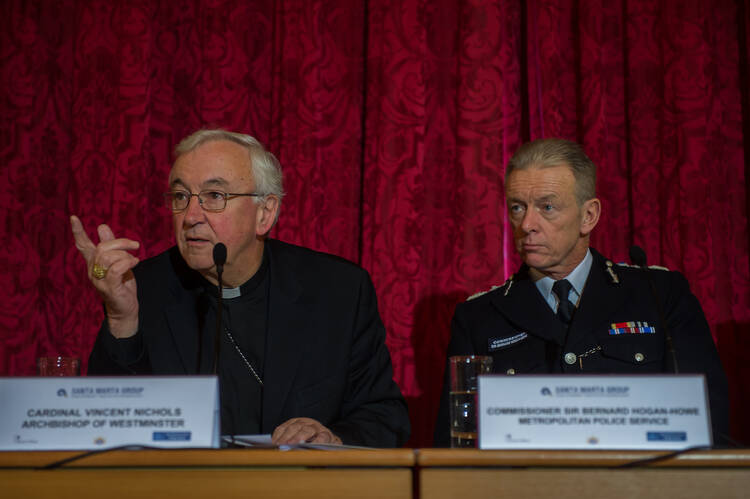The Catholic Bishops’ Conference of England and Wales, one of two Conferences in Britain, has issued an outspoken open letter that discusses key issues in the forthcoming UK parliamentary election, May 7. They cited immigration, a hot-button topic in the national political conversation here, and poverty, chiefly that caused by austerity policies, as prominent issues for Catholics to consider. Also cited were the protection of life, including the more recent questions of assisted suicide, religious freedom and the future of Europe. The Anglican Church, a day earlier, had sparked controversy by calling for a “fresh moral vision” in the campaign. Responses in the brave new digital world of open and frank discussion ranged from support and joy that the Bishops were speaking out, to tedious and repetitive New Atheist commentary that a sophisticated, advanced society has no need of bishops nor the deity they represent, via the equally predictable and just as tedious complaints that the bishops should stay out of political affairs. Just like Jesus did.
Long gone are the days when, at least in certain metropolitan parts of the UK, the bishops could deliver the Catholic vote by a simple say-so. In those days it would not have surprised many, although it would have outraged some, to hear an open instruction from the Sunday pulpit to vote for a particular party. And that party would invariably be Labour. Complex sociological reasons stood behind this, more so than religious, theological or even confessional reasons. Roman Catholics were suspect, as they were in U.S. society too, but for different reasons. In the big industrial conurbations, anti-Catholic feeling was much less a distant remnant of the 16th century Reformations and much more a discrimination against the immigrant; large numbers of migrants came to these shores too in the 19th century, as they did to the eastern seaboard of the United States. Many of these were Catholics; Irish, obviously, fleeing the terrible Great Hunger but also Italians, Poles, Lithuanians, other Europeans. In Scotland another significant group were the Highlanders and islanders, still visible groups in that nation’s four cities. Against that setting, in the context of expanding industrialized cities with all the social deprivation that growth brought, Catholic bishops and pastors would propel their flocks towards the party seen as most likely to deliver social justice.
But that situation does not obtain any more. Now the task that the bishops have set themselves is to encourage people simply to vote. There is anxiety that many people, particularly the young, are becoming disengaged from electoral politics. A massive and striking level of cross-generational political engagement in the Scottish referendum last year has not been matched elsewhere in the UK. Some opinion-formers with the ear of young people have recently preached disengagement: “they’re all the same”; while several recent cash-based scandals involving prominent political figures threatened to deepen cynicism. Strongly encouraging engagement with the electoral process, the bishops advised “Whom you vote for is a matter for you alone. Our aim is to suggest how you might approach this important question in May 2015 and to suggest some key issues for your reflection as you make your own decision”. The Letter issued by the bishops spoke of politics as a “vital and necessary vocation” and asked people to consider how their vote could best serve the common good.
The leading prelate in England and Wales, Cardinal Vincent Nichols of Westminster, emphasized in the media that he was recommending no single party but that the bishops wanted to encourage Catholic voters to “test” the candidate parties on several key topics. Speaking on BBC TV, he picked out immigration and inequality as prominent matters. His discussion of these matters is no bland churchy critique but a head-on confrontation with things that politicians and parties are actually saying at the moment. Immigration, and the stances taken by the parties, are seldom far from the headlines. Acknowledging that immigration is a “really difficult issue,” the cardinal widened the question to embrace the human reality of migrants today: “these are people we're talking about - the people who drown in the Mediterranean trying to get into Europe, the people caged in Calais because they're desperate. We have to somehow keep the human person at the front of all these issues.” He continued, in a remark that attracted much comment, “And remember that this city, [London] for example, would grind to a halt without the contribution of people who've come to this country.”
Migrants, more than a century on, once again have become a significant theme in how the Catholic bishops advise the Catholic community as an election looms, as has poverty and inequality. When the bishops speak out like this, whether the topic is migration, or poverty and inequality, or any policy that lacks humanity, they are able to refute those who accuse the church of keeping its people subdued by promises of a bountiful hereafter. They are able to remind us all of Martin Luther King’s dictum that any religion that does not concern itself with social justice is a “spiritually moribund religion only waiting for the day to be buried.” They should be able to convince younger voters especially that politics can still change things rather than keep things the same, but also that politics itself has to change – and that they can do the changing. This is why the bishops’ advice is to vote, not to disengage; politics, said Cardinal Nichols, is “everybody’s business.”








